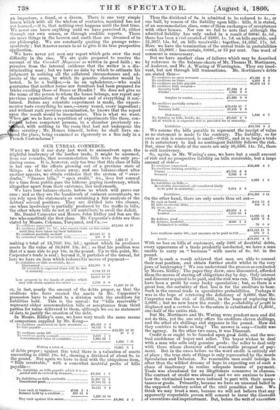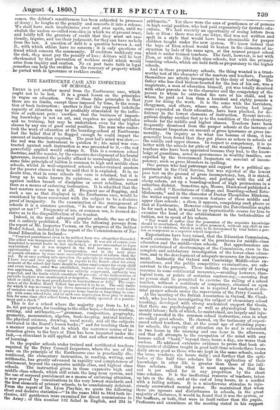017R "UNREAL COMMERCE.
WHEN we felt it our duty last week to animadvert upon the frightful insolvency of the leather trade, it might be assumed, from our remarks, that accommodation bills were the only pro- ducing cause. It is, however, only too true that this class of bills is but one of the effects growing out of a previous state of things. As the mist clears away, and one balance-sheet after another appears, we obtain evidence that the system of "over- drafts," "finance bills," " open credit," dre., does but conceal for a time from public gaze the hideous gaping insolvency, which altogether apart from their existence, lies underneath. We have four balance-sheets before us which will prove our case ; and as they are the handiwork. of eminent accountants we can rely upon the statements as containing a fair analysis of? the debtors several positions. They are divided into two classes, one when insolvency is partially produced by the traffic in bills, the other where bills do not at all contribute to swell the deficit.
Mr. Daniel Carpenter and Messrs. Sohn Ridley and Son are the two who constitute the first class. Mr. Carpenter's debts are thus stated by Messrs. Coleman, Turquand, and Co. :-
To creditors unsecured £12,081 18 10 To creditors 2,667/. 7s. 7d., who cannot claim on this estate until they have taken up their liabilities
To creditors partially secured To estimated value of security held Less property in the bands of parties which they will retain against the above 1,150 0 0 11,665 10 10 or, in fact, nearly the amount of the debts proper, so that the creditors who have created the assets in Mr. Carpenter's possession have to submit to a division with the creditors for liabilities held. This is the unreal : for "bills receivable" represent either accommodation bills or acceptances from third parties for value delivered to them, although we see no statement of data to justify the creation of the debt. In Messrs. Ridley's case, we have very much the same means of comparison supplied by Mr. Kemp- To creditors unsecured on open accounts.... £2,419 6 4 To bills payable 10,152 6 6 £12,571 12 10 To creditors under 10/ 31 4 4 To creditors partly secured 2,937 1 0 Less estimated value of securities 1,884 13 1 1,052 7 11
Making a total of 13,655 5 1
of debts proper ; against this total there is a valuation of assets amounting to 5366/. 16s. 8d., showing a dividend of about 88. in the pound. But again we have to deal with the ubiquitous item,
"Bills receivable," with a somewhat doubtful prefix of bills payable- To liabilities on bills payable which it is ex- pected will be retired by drawers £3,286 1 7 To liabilities on bills receivable 31,307 15 9
Considered'good 21,166 15 6 £2,023 17 5 400 0 0
1,623 17 5 making a total of 13,705/. 16s. 3d.; against which he produces assets to the value of 10,9481. 138. 5d.; so that his position was that of a man able to pay 16s. in the pound. Up to this point, Mr. Carpenter's trade is real ; beyond it, it partakes of the unreal, for here we have an item which reduces his means of payment-
To liabilities on bills receivable, &e.- Discounted £22,598 3 9 Of whichit is expected there will be met at maturity 9,782 12 11 12,815 10 10 10,141 0 3 Less cash at bankers £566 2 4 Balance held by a creditor 670 13 6 - 1,236 15 10
May rank against this estate
£8,901 4 5
Thus the dividend of 8s. is admitted to be reduced to 4s., or one half, by reason of the liability upon bills : bills, it is stated, of an accommodation class, some of them exchanges of acceptances with other houses. Nor can we fail to note that although the admitted liability has only ended in a result of 8904/. 48. 5d., there has been a risk created of 3286/. 18. 7d. on bills payable, and 31,307/. 15s. 8d. on bills receivable ; together, 34,593/. 17s. 3d. Here we have the termination of the unreal trade in probabilities
-risk 35,0001.: loss certain, 89001., or 25 per cent. One word of comment is unnecessary. But we have another class of failures which may be described by reference to the balance-sheets of Mr. Thomas H.' . Mortimore of Andover, and Mr. A. Waring of Warrington. They are insol- vent, but not through bill transactions. Mr. Mortimore's debts are stated thus- To creditors on open accounts 2 To creditors on loans To creditors on bills payable 6 To creditors fully secured- Security held £7,888 0 0 Claims 5,932 0 0 Surplus to contra £1,956 9 0 To creditors partially secured- Claims £22,044 15 7 Security held 20,198 9 0 Deficiency To liability on bills, bonds, 8:c £9,625 0 0 All of which it is expected will be provided for at maturity.
Liabilities £95,754 9 3 We assume the bills payable to represent the receipt of value as no statement is made to the contrary. The liability, so far even as risk is concerned, is small-9625/., and in so large a trade it is satisfactory to find no contingent liability follows the risk.
But, since the whole of the assets are only 56,3561. 14s. 7d., there is still insolvency. So, again, in Mr. Waring's case, we have but a small amount of risk and no prospective liability on bills receivable, but a large amount of debt-
To creditors unsecured To creditors holding security,- Claims Security Deficiency To liabilities on bills,- Receivable discounted (all considered likely to be paid at maturity) Liabilities £56,361 5 11 On the other hand, there are only assets thus set out- By cash in hand £454 12 6
By bills receivable ditto 405 0 5
By stock, lee.- Warrington £9,010 1 0 Loudon 5,625 10 4
By debtors, good 4,e75 9 6
By debtors, doubtful £340 2 3 Estimated to realize • 70 0 0 £19,644 13 9
Less creditors under 101., and amounts to be paid in full 278 9 1
Assets £19,366 4 8
With no loss on bills of customers, only 3401. of doubtful debts, every appearance of a trade prudently oonducted, we have a man unable to carry on " business " with assets of Os. 6d. in the pound.
How is such a result achieved that men are able to conceal their real position' and obtain further credit whilst in the very jaws of bankruptcy? We can understand the process as conducted by Messrs. Ridley. The paper they drew, once discounted, afforded them the means of staving off obligations day by day. Only interest and discount required to be paid, and the risk was run. There might have been a profit by some lucky speculation ; but, as there is a eat loss, the certainty of that loss is for the creditors to bear. Such is the unreal trade in speculative probabilities. Perhaps it was in the hope of retrieving the deficiency of 3,000/. that Mr. Carpenter ran the risk of 22,5931., in the hope of replacing the 3,0001.; but we now know the result : the probability of profit is displaced and a certain loss to the estate is substituted of 11,6651., one-half of the entire risk.
But Mr. Mortimore and Mr. Waring were prudent men and did not do this, yet the one only offers his creditors eleven shillings, and the other six shillings and sixpence in the pound. How did they contrive to trade so long ? The answer is easy-Credit was the agency, In the other two cases, it was Discount.
Credit is or ought to be founded upon good faith, and the mu- tual confidence of buyer and seller. The buyer wishes to deal. with a man who sells only genuine goods ; the seller to deal only with those whose character afford reasonable prospect of pay- ment. But in the cases before us the word credit is entirely out of place ; the true state of things is only represented by the words Speculation and Delusion. No reasonable man could indulge in other than the wildest dreams of hope in expecting out of such a chaos of insolvency to realize adequate means of payment. Trade was abandoned for an illegitimate commerce in chances. The contract of credit was abused ; and we are anxious to know how the victimized losers were induced to part with their aocep- tames or goods. Primarily, because we have an unsound belief in the supposed salutary action of the civil penalties of law. We think we may trust a man, because we will not believe thatany- apparently respectable person will consent to incur the discredit of executions and imprisonment. But, before the writ of execution,
£3,226 2 4,605 6 86,076 14 1,846 6 7 £53,468 4 3
£6,733 6 8
3,840 5 0 2,893 1 8 9,214 3 6 14,635 11 4
comes, the debtor's sensitiveness has been subjected to processes of decay ; he laughs at the penalty and converts it into a release. We shall have such insolvencies over and over again, until we abolish the useless so-called remedies in which we at present trust, and boldly tell the granters of credit that they must act cau- tiously, inquire, and use their judgment, for they can have no help from the law. A question of debt is a question between A. and B., with which others have no concern ; it is only questions of fraud which concern the community. If creditors recklessly ran the risk, they must pay the penalty of loss ; debtors will be best checkmated by that prevention of reckless credit which would arise from inquiry and caution. No ex post facto faith in legal ,remedies can help the creditor in the recovery of property which ..he parted with in ignorance or reckless credit.



























 Previous page
Previous page